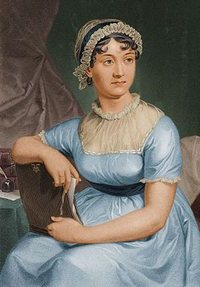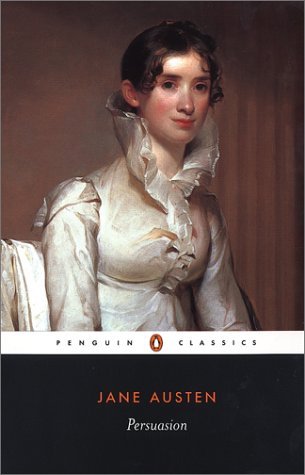By: Emily Fritcke
Sales guru and best-selling author, Zig Ziglar, pronounced himself as the “Undisputed King of Motivation.” His career soared in the 1970s and encompassed multi-million dollar book sales, speaking tours, and a legacy of enthusiastic inspiration for individuals desiring ‘the next level’ of achievement. An engaging speaker, Ziglar was renowned for his many quotes about success, which relate to both professional and personal goals, such as this one that is applicable to our weekly theme of persuasion:
“The most important persuasion tool you have in your entire arsenal is integrity.”
The beauty of this quote is its simplicity. Unlike other sources that offer step-by-step outlines of how to persuade others, Ziglar’s message is clear and concise, accentuating the significance of the elements of honesty and reliability in an individual’s endeavors.
 A compelling example of
creative integrity is the conviction a writer has in his or her literary
vision. Celebrated author, Jane Austin, illustrates
exemplary integrity in persevering in her commitment to her
personal writing style and avoiding compromising her
artistic principles by succumbing to the lure of commercial
success. The Secretary of
Prince Leopold of the House of Saxe-Coburg attempted to commission Austin
to write “a historical romance illustrative of the august
House of Coburg.” He suggested this venture would be
mutually beneficial to both parties because it would be
politically advantageous to the Prince and would bring
Austin financial success. The timing of the proposal
coincided with the failure of Austin’s most recent book,
Mansfield Park. Austin responded to the secretary’s proposition with
astounding grace in a letter, published in
A Memoir of Jane Austin, in which she wrote:
A compelling example of
creative integrity is the conviction a writer has in his or her literary
vision. Celebrated author, Jane Austin, illustrates
exemplary integrity in persevering in her commitment to her
personal writing style and avoiding compromising her
artistic principles by succumbing to the lure of commercial
success. The Secretary of
Prince Leopold of the House of Saxe-Coburg attempted to commission Austin
to write “a historical romance illustrative of the august
House of Coburg.” He suggested this venture would be
mutually beneficial to both parties because it would be
politically advantageous to the Prince and would bring
Austin financial success. The timing of the proposal
coincided with the failure of Austin’s most recent book,
Mansfield Park. Austin responded to the secretary’s proposition with
astounding grace in a letter, published in
A Memoir of Jane Austin, in which she wrote:
“No, I must keep to my own style and go on in my own way; and though I may never succeed again in that, I am convinced that I should totally fail in any other.”
 This tactfully worded response is a notable illustration of
how personal integrity prevailed over the enticement of
shallow success. Jane Austin is revered for her distinctive
style, which examined the complex intimacies of domestic
life in country villages. Had Austin consented to write an
idealized historical tale of a Prince, her literary legacy
could be very different than the one she is recognized for
today. At the time Austin drafted her response to the
Secretary of Prince Leopold, she began work on her final
novel, which was published following her death. This final
novel, titled
Persuasion, exemplified Austen’s signature narrative style and
was widely admired as a poignant love story.
This tactfully worded response is a notable illustration of
how personal integrity prevailed over the enticement of
shallow success. Jane Austin is revered for her distinctive
style, which examined the complex intimacies of domestic
life in country villages. Had Austin consented to write an
idealized historical tale of a Prince, her literary legacy
could be very different than the one she is recognized for
today. At the time Austin drafted her response to the
Secretary of Prince Leopold, she began work on her final
novel, which was published following her death. This final
novel, titled
Persuasion, exemplified Austen’s signature narrative style and
was widely admired as a poignant love story.
Jane Austin’s loyalty to her own personal writing style reveals to us that in order to be successful you must not only learn to persuade, but also recognize when not to be persuaded. Austin’s integrity and commitment to her artistic vision is what earned her distinction as a beloved author. She could not be persuaded to abandon her writing style by the deceptive inducement of financial gain; thus, it was her integrity and commitment to her personal principles that contributed to her enduring success as a literary luminary.

I agree that honesty and integrity are ultimately important features in the art of persuasion. I don’t think you’re going to accomplish anything in the realm of persuasion without being able to convince your audience that you have integrity worth paying attention to. I think that many have tried and accomplished persuasion without integrity or honesty, but in the end they will be caught and history will not recognize these individuals as the successes of persuasion. Love your reference to Jane Austin – I’ve always admired her unique voice and talents.
What a great story! I’ve never heard this about Jane Austin before (but to be fair, I’ve never read her either). Creative integrity (and integrity in general of course) is so important! I’m glad she stuck to her guns and still managed to stay tactful. Good for her, and how inspiring!